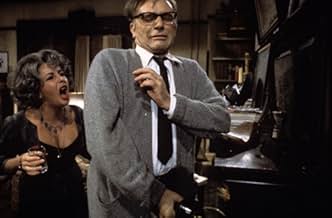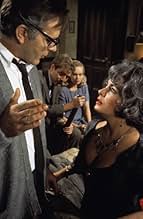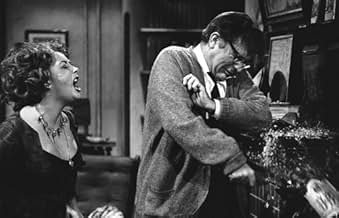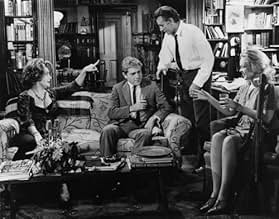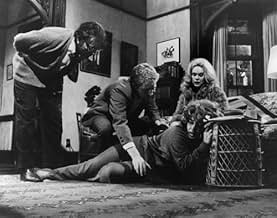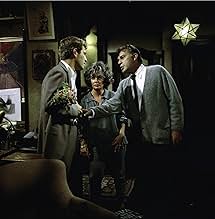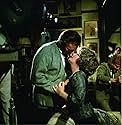A middle-aged New England associate professor and his wife, with the help of alcohol, use their young guests to fuel anguish and emotional pain towards each other over the course of a distre... Read allA middle-aged New England associate professor and his wife, with the help of alcohol, use their young guests to fuel anguish and emotional pain towards each other over the course of a distressing night.A middle-aged New England associate professor and his wife, with the help of alcohol, use their young guests to fuel anguish and emotional pain towards each other over the course of a distressing night.
- Won 5 Oscars
- 22 wins & 26 nominations total
- Director
- Writers
- All cast & crew
- Production, box office & more at IMDbPro
Featured reviews
10Rathko
An undisputed classic that chronicles every appalling moment of a drunken night in hell as middle-aged George and Martha tear each other, and their guest, to pieces.
Elizabeth Taylor proves categorically that she was a truly great actress. Her Oscar-winning performance as the psychologically tormented Martha is one of the greatest performances in the history of cinema. Taylor's imperceptible shifting from sadism to tenderness, from bullying condescension to exhausted vulnerability, is a masterclass in character building. Martha is a truly monstrous character, and yet Taylor is able to imbue her with sympathy, allowing you brief glimpses of the warm and lovable woman she could have been.
Richard Burton is equally magnificent as George; an ageing, failing college professor whose initial meekness gives way to a raging torment all of his own. His verbal sparring with Taylor, like two pit-bulls in the ring of an endless and bloody dogfight, has become legendary. Every word drips with malice and contempt, every sentence is designed to cut the deepest wound. At times, it becomes painful to watch, but like true train-wreck television, you cannot drag yourself away from the inevitably terrible conclusion.
Quite possibly, this is as close to perfect as movies can get; beautifully written dialogue, deeply complex characters, an evolving and suspenseful storyline, beautiful photography, and a wonderfully understated score by Alex North. Nominated for 13 Academy Awards in 1967, but lost out to A Man for All Seasons and Born Free to win only 5.
"Who's Afraid of Virginia Woolf?" "I am."
Elizabeth Taylor proves categorically that she was a truly great actress. Her Oscar-winning performance as the psychologically tormented Martha is one of the greatest performances in the history of cinema. Taylor's imperceptible shifting from sadism to tenderness, from bullying condescension to exhausted vulnerability, is a masterclass in character building. Martha is a truly monstrous character, and yet Taylor is able to imbue her with sympathy, allowing you brief glimpses of the warm and lovable woman she could have been.
Richard Burton is equally magnificent as George; an ageing, failing college professor whose initial meekness gives way to a raging torment all of his own. His verbal sparring with Taylor, like two pit-bulls in the ring of an endless and bloody dogfight, has become legendary. Every word drips with malice and contempt, every sentence is designed to cut the deepest wound. At times, it becomes painful to watch, but like true train-wreck television, you cannot drag yourself away from the inevitably terrible conclusion.
Quite possibly, this is as close to perfect as movies can get; beautifully written dialogue, deeply complex characters, an evolving and suspenseful storyline, beautiful photography, and a wonderfully understated score by Alex North. Nominated for 13 Academy Awards in 1967, but lost out to A Man for All Seasons and Born Free to win only 5.
"Who's Afraid of Virginia Woolf?" "I am."
10OttoVonB
Ailing couple George (Burton) and Martha (Taylor) invite a young couple over for a late-night drink - much to quiet and repressed George's annoyance - and what starts off as a twisted game by sultry Martha to annoy her husband and get her way with young stud Nick (George Segal) ends up in a horrific duel of wits.
Adapted from the play and boasting very few locations, "Virginia Woolf" is notable for many unsuspected reasons. Designed for the stage, the film makes the story uniquely cinematic and tense, amped up by stunning photography (in Black and White, a daring choice in 1966). The younger leads are superb, but Burton and Taylor still manage to walk away with film, giving stunning renditions of the world's most demented couple. They make the surreal dialogue hurt and touch in ways never thought possible.
Though there are countless reasons to recommend this jewel of a film, there are also reasons why one would wish to avoid it. This is the kind of film that makes you feel like having a showing (or a very concentrated drink) to wash away the grit and human evil and pain absorbed. You'll feel dirty, but in a way you'll also feel enlightened: that a small character film can carry more punch than any explosion-packed blockbuster out there is a thing of beauty indeed!
Adapted from the play and boasting very few locations, "Virginia Woolf" is notable for many unsuspected reasons. Designed for the stage, the film makes the story uniquely cinematic and tense, amped up by stunning photography (in Black and White, a daring choice in 1966). The younger leads are superb, but Burton and Taylor still manage to walk away with film, giving stunning renditions of the world's most demented couple. They make the surreal dialogue hurt and touch in ways never thought possible.
Though there are countless reasons to recommend this jewel of a film, there are also reasons why one would wish to avoid it. This is the kind of film that makes you feel like having a showing (or a very concentrated drink) to wash away the grit and human evil and pain absorbed. You'll feel dirty, but in a way you'll also feel enlightened: that a small character film can carry more punch than any explosion-packed blockbuster out there is a thing of beauty indeed!
One only has sympathy for these ultimately dysfunctional characters as they unfold their little "fun and games," like "Down the Host," "Hump the Hostess," and "Get the Guests." If only George and Martha had retired a wee bit earlier none of this would've happened.
Then, too, why didn't Nick and Honey simply leave, rather than stick around for the "full treatment"? Can it be that "like attracts like," so much so that they couldn't leave?
The final denouement suggests that a new day may be in the offing for poor Martha and George, after the latter has "killed off the 'little bugger.' " Although Martha's admittedly still fearful, she clings firmly to George's hand. Perhaps there's some hope, anyway, for this emotionally spent couple.
Edward Albee, taking no small degree of awareness from Tennessee Williams and Harold Pinter, crafted a play that certainly communicated to a goodly number of people.
Personally recalling sitting in its Broadway run, watching Uta Hagen and cast go through their paces, I remember being as impressed with the riotous audience laughter as with the play itself. The raw lines coming from up-to-then very respectable status characters, namely college prof and wife, seemed to provide some kind of early 60s liberation from the staid and repressive 50s.
By the time the film was released in '66, the public was ready for its no-holds-barred dialogue. It ushered in an new era of social upheaval, of which we're still feeling the effects today.
The "boozy battle" between the hosts, hosts and guests, and guests and guests, paralleled the cultural "steam" being released during that politically "hot" period. The American home drastically changed as a nation experienced more domestic squabbles, separations, divorces, custody battles, and family breakdowns--the last including a noted demise of the traditional "family meal."
In Albee's "long night's journey into morning," the audience must endure two hours of fighting, bickering, insulting, and lamenting before any ray of hope is introduced (during its last five minutes). A long time to wait, but there it is: a glimmer that there may be something better ahead. But we're not sure; after all, "Is this fact or fiction, Martha?"
In an extensive GM Quarterly interview, Director Mike Nichols revealed that this was a very troubled production that almost didn't get finished--with a leading cast boozing and pill-dosing even during lunch breaks--stretching the very limits of professionalism.
Yet in the end, Nichols, Cinematographer Haskell Wexler, and Composer Alex North all got what they wanted. A question is, "was it all worth the effort?" That's something only the individual viewer can answer: is this a case of "nothing from nothing leaves nothing?" or "a cathartic and emotionally moving experience?"
Then, too, why didn't Nick and Honey simply leave, rather than stick around for the "full treatment"? Can it be that "like attracts like," so much so that they couldn't leave?
The final denouement suggests that a new day may be in the offing for poor Martha and George, after the latter has "killed off the 'little bugger.' " Although Martha's admittedly still fearful, she clings firmly to George's hand. Perhaps there's some hope, anyway, for this emotionally spent couple.
Edward Albee, taking no small degree of awareness from Tennessee Williams and Harold Pinter, crafted a play that certainly communicated to a goodly number of people.
Personally recalling sitting in its Broadway run, watching Uta Hagen and cast go through their paces, I remember being as impressed with the riotous audience laughter as with the play itself. The raw lines coming from up-to-then very respectable status characters, namely college prof and wife, seemed to provide some kind of early 60s liberation from the staid and repressive 50s.
By the time the film was released in '66, the public was ready for its no-holds-barred dialogue. It ushered in an new era of social upheaval, of which we're still feeling the effects today.
The "boozy battle" between the hosts, hosts and guests, and guests and guests, paralleled the cultural "steam" being released during that politically "hot" period. The American home drastically changed as a nation experienced more domestic squabbles, separations, divorces, custody battles, and family breakdowns--the last including a noted demise of the traditional "family meal."
In Albee's "long night's journey into morning," the audience must endure two hours of fighting, bickering, insulting, and lamenting before any ray of hope is introduced (during its last five minutes). A long time to wait, but there it is: a glimmer that there may be something better ahead. But we're not sure; after all, "Is this fact or fiction, Martha?"
In an extensive GM Quarterly interview, Director Mike Nichols revealed that this was a very troubled production that almost didn't get finished--with a leading cast boozing and pill-dosing even during lunch breaks--stretching the very limits of professionalism.
Yet in the end, Nichols, Cinematographer Haskell Wexler, and Composer Alex North all got what they wanted. A question is, "was it all worth the effort?" That's something only the individual viewer can answer: is this a case of "nothing from nothing leaves nothing?" or "a cathartic and emotionally moving experience?"
WHOS's AFRAID OF VIRGINIA WOOLF? is a drama film with the elements of black comedy, that on the violent and honest way indicates marital frustration and psyche, through the alcoholism, aging, cynicism and sterility. A dangerous double game becomes more intense and urgency with environmental changes. Simply, we are going through an intimate experience, which is seasoned with an excellent acting. The problem occurs in the moment, when we realize, how much is this experience, as a matter of fact, sincere and painful.
George, an associate history professor at a small New England college, and Martha, the daughter of the university president, live in an unstable and violent marriage. After they return home drunk from a party, Martha reveals she has invited a young married couple, whom she'd met at the party, for a drink. Their guests are Nick, a biology professor, and his wife, Honey. The hosts are engaged in a cruel verbal duel. The younger couple is first embarrassed and later enmeshed. After an evening of a sadistic, perversely hilarious and dangerous clashes", a painful truth comes to the light.
Mr. Nichols keeping his camera close, so that, violent emotions, defeats and cramps on the faces of the actors come to the fore. The direction is excellent, because it is very difficult to draw the line between passion borders and boundaries of a nervous breakdown. The characters are lost in a futile and desperate struggle, which celebrates a kind of demonic love in an attempt to save a bad marriage.
The characterization is excellent and fully corresponds with sharp dialogues and gloomy atmosphere.
Elizabeth Taylor as Martha is definitely a major figure in this film with her acceptance of gray hair and her use of profanity. It is difficult to accept that such a beautiful face hides a violent and so crazed but again, fragile and deeply wounded character. Richard Burton as George is worthy as a her counterweight. He is not a victim, he is the husband who is tired of everything, while he tries to put all the things in the right place. The couple has offered an excellent performance.
George Segal as Nick is a young man who moves between confusion, arrogance and dominance in their relations. Sandy Dennis as Honey is his bland wife. She is not up to this unscrupulous game.
This is a brutal clash between unhappy spouses who move the boundaries of inhumanity, while they skillfully flee from the truth.
George, an associate history professor at a small New England college, and Martha, the daughter of the university president, live in an unstable and violent marriage. After they return home drunk from a party, Martha reveals she has invited a young married couple, whom she'd met at the party, for a drink. Their guests are Nick, a biology professor, and his wife, Honey. The hosts are engaged in a cruel verbal duel. The younger couple is first embarrassed and later enmeshed. After an evening of a sadistic, perversely hilarious and dangerous clashes", a painful truth comes to the light.
Mr. Nichols keeping his camera close, so that, violent emotions, defeats and cramps on the faces of the actors come to the fore. The direction is excellent, because it is very difficult to draw the line between passion borders and boundaries of a nervous breakdown. The characters are lost in a futile and desperate struggle, which celebrates a kind of demonic love in an attempt to save a bad marriage.
The characterization is excellent and fully corresponds with sharp dialogues and gloomy atmosphere.
Elizabeth Taylor as Martha is definitely a major figure in this film with her acceptance of gray hair and her use of profanity. It is difficult to accept that such a beautiful face hides a violent and so crazed but again, fragile and deeply wounded character. Richard Burton as George is worthy as a her counterweight. He is not a victim, he is the husband who is tired of everything, while he tries to put all the things in the right place. The couple has offered an excellent performance.
George Segal as Nick is a young man who moves between confusion, arrogance and dominance in their relations. Sandy Dennis as Honey is his bland wife. She is not up to this unscrupulous game.
This is a brutal clash between unhappy spouses who move the boundaries of inhumanity, while they skillfully flee from the truth.
This is still an exceptional film from the 1960s. Though some of the epithets are obviously softening much stronger words, the language is frank and brutal, Martha's bludgeoning body-blows balanced by George's icepick thrusts. Edward Lehman's respectful screenplay gently opens up Edward Albee's one-set play while keeping a certain claustrophobic atmosphere. Mike Nichols' first directing effort is stunning in its lack of artifice; rarely do you feel that the director has done much more than turn on the camera and watch four actors, all at the top of their game, tear into their roles. George Segal's work in this movie is criminally underrated, but his reactive work as studly, ultimately disappointing Nick should be mandatory study by all young actors. Sandy Dennis' fluttery turn as mousy, wifey Honey is powerful also; a lot more is going on than you might think. Richard Burton is staggering as George ("Georgie Porgie Put-upon Pie"), and his performance demonstrates the magic that he could bring to a worthy role. Elizabeth Taylor's work here still astounds. The physical transformation she undertook to become aging harpy Martha is amazing enough, but her performance seems to channel a hurricane's force and fury. By turns hilarious, maddening and then, at the end, exhausted and defeated yet again, Taylor demonstrates acting, particularly film acting, at its best. The film is by no means easy or "Hollywood" in feel-- the audience is as exhausted as the characters at the end. But this was a bracing, necessary antidote to the impossible ideal of marriage usually portrayed in the movies. A towering film.
Did you know
- TriviaThis became the first movie in Academy Awards history since Cimarron (1931) to be nominated for every Academy Award category in which it was eligible, including Best Adapted Screenplay (Ernest Lehman), Director (Mike Nichols), all of the acting categories (Richard Burton, Dame Elizabeth Taylor, George Segal and Sandy Dennis) and Picture of the Year (Ernest Lehman).
- GoofsThe four characters stop at a bar after the first soiree at George's house. It is clearly after 2:00 a.m., since the time was stated during the first segment. No bars, however, would have been open after 1 or 2 a.m. in the New England states, where the film is set.
- ConnectionsEdited from La Lettre (1940)
- SoundtracksWho's Afraid of Virginia Woolf?
(to the tune of "Here We Go Round the Mulberry Bush")
Traditional English melody
Original lyrics ("Who's Afraid of the Big Bad Wolf?") by Frank Churchill and Ann Ronell; modified by Edward Albee
Performed by Elizabeth Taylor
Details
- Release date
- Country of origin
- Languages
- Also known as
- ¿Quién le teme a Virginia Woolf?
- Filming locations
- Cambridge, Massachusetts, USA(location)
- Production companies
- See more company credits at IMDbPro
Box office
- Budget
- $7,500,000 (estimated)
- Gross US & Canada
- $28,000,000
- Gross worldwide
- $28,007,258
- Runtime
- 2h 11m(131 min)
- Color
- Sound mix
- Aspect ratio
- 1.85 : 1
Contribute to this page
Suggest an edit or add missing content


